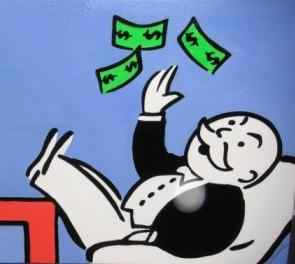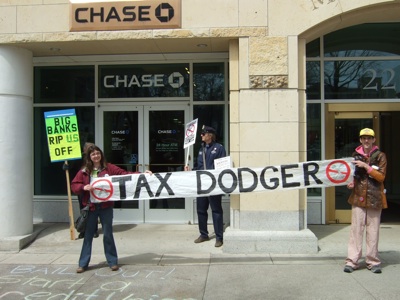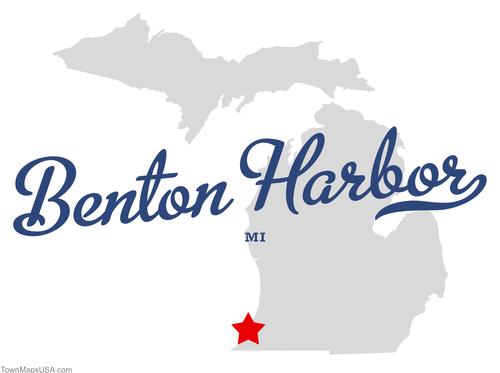Wisconsin Supreme Court Recount Begins
The recount in Wisconsin's Supreme Court race begins on Wednesday, April 27. Why was the recount called, how will it be carried out, and how can individuals get involved?

The recount in Wisconsin's Supreme Court race begins on Wednesday, April 27. Why was the recount called, how will it be carried out, and how can individuals get involved?
If I had stayed in the insurance industry, my net worth would have spiked between 4 p.m. Wednesday and 4 p.m. Thursday last week -- and I wouldn't even have had to show up for work.
 I'm betting that just about every executive of a for-profit health insurance company, whose total compensation ultimately depends on the value of their stock options, woke up on Good Friday considerably wealthier than they were 24 hours earlier. Why? Because of the spectacular profits that one of those companies reported Thursday morning.
I'm betting that just about every executive of a for-profit health insurance company, whose total compensation ultimately depends on the value of their stock options, woke up on Good Friday considerably wealthier than they were 24 hours earlier. Why? Because of the spectacular profits that one of those companies reported Thursday morning.
Among those suddenly wealthier executives, by the way, are the corporate medical directors who decide whether or not patients will get coverage for treatments their doctors believe might save their lives.
The White House is circulating a draft Executive Order requiring disclosure of contributions to "third party" or "independent" expenditure groups by corporations receiving government contracts. During the 2010 elections, much of the unlimited election spending made possible by the U.S. Supreme Court's Citizens United decision was kept secret by groups taking advantage of the 501(c) section of the tax code. The President's proposed order would lift the veil on secret spending in time for the 2012 elections.
On Saturday, April 30, the fight for collective bargaining will bring a different type of activist to Madison's Capitol Square. As many as 10,000 motorcyclists from around Wisconsin and across the Midwest will ride in support of Wisconsin workers at the "Thunda Around the Rotunda" event.
Union supporters celebrated and right-wingers raged when the Associated Press reported on April 15 that Governor Scott Walker admitted Wisconsin saves no money by "weakening government workers' collective bargaining rights." When responding to a question from Rep. Dennis Kucinich during congressional testimony, did Walker really admit the union-busting bill costs no money? And will implementing the annual recertification requirement actually cost Wisconsin taxpayers?
 The almost $200 million in tax cuts that Wisconsin Governor Scott Walker has given to corporations have been both lauded and hated by the public and media.
The almost $200 million in tax cuts that Wisconsin Governor Scott Walker has given to corporations have been both lauded and hated by the public and media.
The Institute for One Wisconsin, a non-partisan organization, released a report (pdf) last week that says that "despite claims from Governor Scott Walker, Wisconsin is not 'broke.'" Their research found that the state's Gross Domestic Product (GDP) has risen in the past twenty years, and though the state is overall quite wealthy, the bulk of that wealth has shifted to the richest people of the state, while Wisconsin's tax structure "is built around the middle class."
How does this shift in wealth make the state look as though it was broke? One Wisconsin stated that "this discrepancy has led to tax revenues failing to keep pace with Wisconsin's GDP, an over tax-burdened middle class, and budget shortfalls, instead of surpluses." While tax cuts for the wealthiest of the country and state have been extended, the tax burden has now been handed over to the middle class of the state, creating a disparity in people's falling incomes and rising taxes in the middle class.
 At a rally held in front of Chase Bank on Capitol Square in Madison, Wisconsin today, a few dozen people gathered to air their grievances against Chase and other U.S. corporations who will pay no taxes for 2010. Jeff Kravat of MoveOn hosted the rally along with Gene Lundergan, who gathered a group of four or five people to present a tax bill of almost $2 billion to the branch bank manager. This bill, for $1.988 billion, was drawn up using Chase's 2010 10-K filing with the Securities and Exchange Commission (SEC) and a December 2008 U.S. Government Accountability Office (GAO) report (pdf). When Lundergan, Steve Hughes of Young Progressives and several others approached the front entrance of the bank, they were refused admission by the security guard, so they left the bill propped in the front window.
At a rally held in front of Chase Bank on Capitol Square in Madison, Wisconsin today, a few dozen people gathered to air their grievances against Chase and other U.S. corporations who will pay no taxes for 2010. Jeff Kravat of MoveOn hosted the rally along with Gene Lundergan, who gathered a group of four or five people to present a tax bill of almost $2 billion to the branch bank manager. This bill, for $1.988 billion, was drawn up using Chase's 2010 10-K filing with the Securities and Exchange Commission (SEC) and a December 2008 U.S. Government Accountability Office (GAO) report (pdf). When Lundergan, Steve Hughes of Young Progressives and several others approached the front entrance of the bank, they were refused admission by the security guard, so they left the bill propped in the front window.
 Tea Party members who railed against health care reform because of the spin they were sold about how "Obamacare" would affect Medicare played a big role in returning the House of Representatives to Republican control.
Tea Party members who railed against health care reform because of the spin they were sold about how "Obamacare" would affect Medicare played a big role in returning the House of Representatives to Republican control.
I'm betting that many of them, if they're paying attention to what Rep. Paul Ryan (R-Wisconsin) wants to do to the Medicare program, are having some serious buyer's remorse. If Democrats are wise, they're already drafting a strategy to remind Medicare beneficiaries, including card-carrying Tea Party members, just how fooled they were into thinking that Republicans were the protectors of the government-run program they hold so dear.
The week of April 10-16 saw the layoff of every public school teacher in Detroit, and the initial fruition of the highly-contested bill that allows emergency financial managers to have unconditional control over a city in a financial emergency. The city of Benton Harbor, Michigan, declared to be in a financial emergency by Governor Rick Snyder, now knows that, according the Snyder, the voter's voice doesn't really matter anymore.
 Joseph Harris, the city's new Emergency Financial Manager (EFM), dismantled the entire government, only allowing city boards and commissions to call a meeting to order, approve of meeting minutes and adjourn a meeting.
Joseph Harris, the city's new Emergency Financial Manager (EFM), dismantled the entire government, only allowing city boards and commissions to call a meeting to order, approve of meeting minutes and adjourn a meeting.
The law that allows Harris to "exercise any power or authority of any office, employee, department, board, commission, or similar entity of the City, whether elected or appointed," was passed in March after the urging of Governor Snyder, and despite thousands of protesters who came to the Lansing capitol throughout February and March.
Center for Media and Democracy (CMD)
520 University Ave, Ste 305 • Madison, WI 53703 • (608) 260-9713
CMD is a 501(c)(3) tax-exempt non-profit.
© 1993-2025